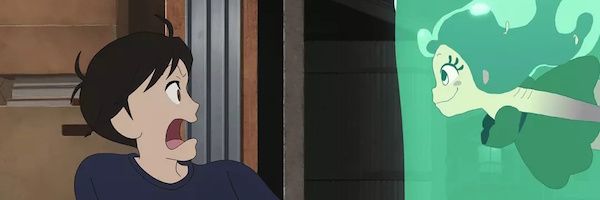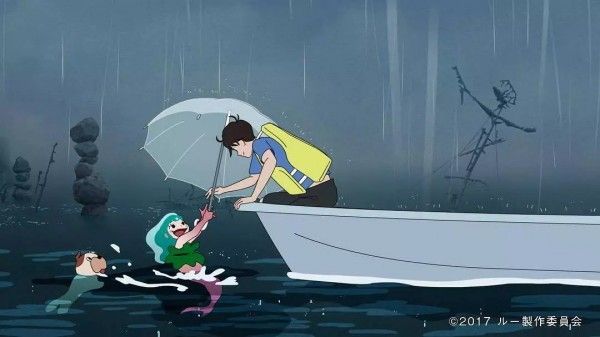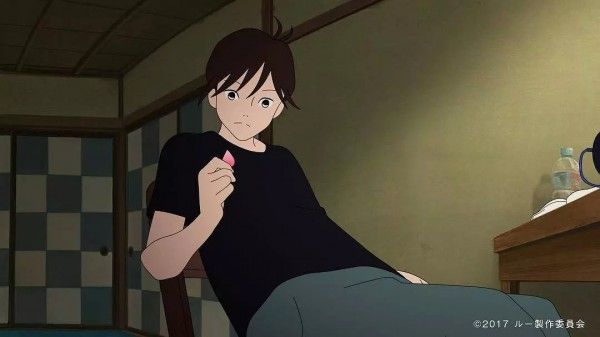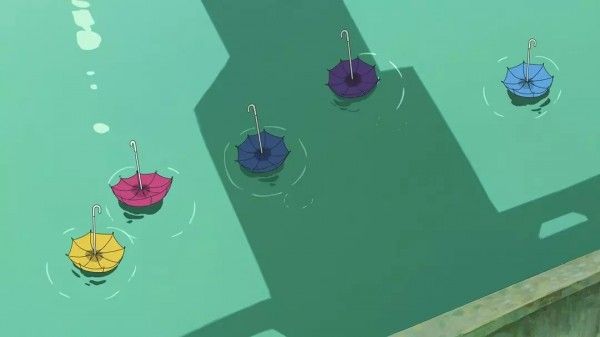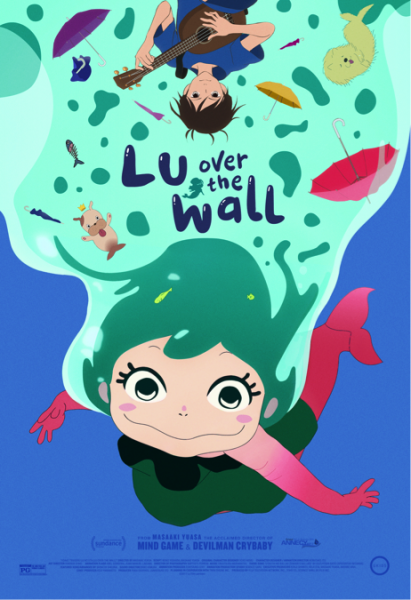During this years Sundance Film Festival, writer-director Masaaki Yuasa's newest film Lu Over the Wall premiered its English version, continuing the artfully animated film's festival run. I had a chance to chat with the accomplished artist and filmmaker at the time. Now, since the musical mermaid movie is now set to arrive in U.S. theaters in limited release starting today, we wanted to bring that conversation to you.
Lu Over the Wall is a twist on the classic mermaid mythology that sees the title character--a precocious and curious mermaid--making herself known to a human boy in a local fishing village. What transpires is a light and airy tale of mischief, music, and socio-cultural conflict that ultimately leads to a change in the hard-hearted humans. Lu Over the Wall is a singular viewing experience that's hard to compare to anything else in modern cinema, but if you love dynamic music, wildly artistic animation, and epic beach dance parties, you'll want to check this film out. For a deeper dive on Lu Over the Wall, my chat with Masaaki Yuasa follows below.
What was it about this story that made you want to take up the director’s chair?
Masaaki Yuasa: Lu Over the Wall is an original story that I created and wrote, which I then animated. In the past, I had a story about a vampire girl and boy that interested me. This time, I wanted to make a story that children would be interested in, so that became Lu Over the Wall.
How did you come up with the twist on mermaid mythology?
Masaaki Yuasa: I wanted to use the traditional type of characters that we have in the story. The relationship between merfolk—mermaids—and people is that they find each other difficult to understand, but I wanted to make that into a kind of fun and enjoyable misunderstanding and then also create a film so that children as well as adults could enjoy.
Since music is such a big part of this movie, what is your personal relationship with music?
Masaaki Yuasa: I feel that music is something that we have to have, and if we didn’t have music, we would miss it very much. Sometimes I go to a concert and I feel like the only one who’s really into the music and feeling like I want to dance while other people around me don’t necessarily react that way, so I feel like they should be more into it.
In Lu, I brought out this aspect by showing that some of the people were very stiff and didn’t like to dance, but the merfolk were the ones having a lot of fun and liked to dance. I felt that they could influence each other and become friends through dance.
How did you go about finding the movie’s specific sound?
Masaaki Yuasa: For each scene, I thought of what would give that scene a kind of excitement and chose pieces of music, or had them composed, for those scenes. The last song that the characters’ sing, I hadn’t really decided on that song at the beginning of the film, but I thought that would be a very fitting end to the film. That is the “Ballad of a Singer,” which is a popular song from the past. I used that song because I thought it was the best fit.
Do you have any personal connections to growing up in a small fishing village like in the movie? If not, why set the movie there versus a bigger city?
Masaaki Yuasa: The story if one in which the town becomes liberated and, in order to show that, I thought it would be best if I could show a compact town, a unique town, and show how the people in that town become more liberated. Recently, I’ve heard from relatives and other young people that they’re in a quandary of whether to go to the big city, whether to go to Tokyo or not when they’re from a small town. I thought that was something that we struggled with in the past, such as when I was growing up, but I realize that it still exists unchanged, that’s still a problem for young people growing up today in the smaller towns. There’s a big pressure on them, the pressure of, if they go into the big city, then they never really come home. Or a fear of the big city and wondering if they can really make it in the big city. This film is one that shows that it’s best to be able to honestly express your feelings, such as being afraid or not having courage. One of the themes is pressure and fear of going to the big city, or staying in a small town.
Another theme seems to be the conflict between industry and tourism versus local traditions and mythology.
Masaaki Yuasa: I think, in different tribes for example, who live in different environmental backgrounds, if they have to share a certain area, then there are disadvantages to one tribe versus the other, or advantages to one tribe versus the other. It’s very difficult for them to come together and become unified, but I think they can coexist and live together in the same area.
In this film, I express that as the mermaids and merfolk, and the humans, finding it very difficult to live in the same space. That is a big problem. But even so, they can eventually come to a situation where they can live together.
Another interesting aspect was the focus on food, especially seafood, as not only the town’s industry but also the characters literally breaking out of their shells…
Masaaki Yuasa: I myself love to eat. [laughs] But from a small age, it worried me that what we can eat and what we don’t eat. Even animals that seem rather cute, we end up eating them at times. I wanted to show that there’s some way that we can relate to the animals, although we have this issue of eating them, so …
I loved that there were various styles of animation in this movie. How did you go about developing a different look for different parts of the story?
Masaaki Yuasa: For this film, I basically wanted to use an orthodox way of animating, but for the action scenes, I thought it would be essential to show the action and the movement. So that’s why I made it more dynamic and more deformed to make that come to life more.
For the flashbacks, in my own head when I think about the past, things are a little fuzzy and unclear, but I wanted to make it a kind of Impressionistic memory in the flashbacks. I also wanted to make it clear to the audience, so they could realize and understand that they were flashbacks rather than what is currently happening in the film.
You’ve cited influences like Tex Avery and classic Disney films, but how have you developed your own signature style?
Masaaki Yuasa: This is a story of a young boy learning to express how he feels in an honest way, so I really did use the influences that I had from Tex Avery and early Disney works, as well as works that were kind of soft from the very earliest days of Japanese animation as well.
How does working on features compare to writing and directing anime series?
Masaaki Yuasa: I feel that films have to have a very high quality, films are works that once a person starts watching a film, they’ll watch until the end. But in terms of television, it’s more the storyline that draws people in. If a viewer is not taken in by one segment of the story, then they won’t continue watching to the next episode. So you have to grab the audience much earlier on the TV series. And so, for television, I try to structure it so that they’ll want to keep watching to the next episode!
Lu Over the Wall is in limited U.S. theaters now thanks to MarVista Entertainment and will be arriving on Blu-ray this summer!

